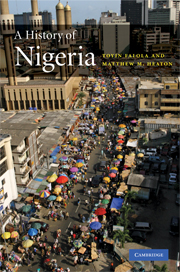Book contents
- Frontmatter
- Contents
- List of illustrations
- List of maps
- Acknowledgments
- Chronology
- Notable people in Nigerian history
- List of abbreviations
- Glossary
- Map 1 Major cities and ethnic groups in present-day Nigeria
- Introduction
- 1 Early states and societies, 9000 BCE – 1500 CE
- 2 Slavery, state, and society, c. 1500 – c. 1800
- 3 Political and economic transformations in the nineteenth century
- 4 Transition to British colonial rule, 1850 – 1903
- 5 Colonial society to 1929
- 6 Nationalist movements and independence, 1929 – 1960
- 7 Instability and civil war, 1960 – 1970
- 8 Oil, state, and society, 1970 – 1983
- 9 Civil society and democratic transition, 1984 – 2007
- 10 Nigeria and Nigerians in world history
- Concluding remarks: corruption, anti-corruption, and the 2007 elections
- Notes
- Selected bibliography
- Index
4 - Transition to British colonial rule, 1850 – 1903
Published online by Cambridge University Press: 05 June 2012
- Frontmatter
- Contents
- List of illustrations
- List of maps
- Acknowledgments
- Chronology
- Notable people in Nigerian history
- List of abbreviations
- Glossary
- Map 1 Major cities and ethnic groups in present-day Nigeria
- Introduction
- 1 Early states and societies, 9000 BCE – 1500 CE
- 2 Slavery, state, and society, c. 1500 – c. 1800
- 3 Political and economic transformations in the nineteenth century
- 4 Transition to British colonial rule, 1850 – 1903
- 5 Colonial society to 1929
- 6 Nationalist movements and independence, 1929 – 1960
- 7 Instability and civil war, 1960 – 1970
- 8 Oil, state, and society, 1970 – 1983
- 9 Civil society and democratic transition, 1984 – 2007
- 10 Nigeria and Nigerians in world history
- Concluding remarks: corruption, anti-corruption, and the 2007 elections
- Notes
- Selected bibliography
- Index
Summary
INTRODUCTION
By about 1850 political and economic transformations had begun to alter the make-up of states in the Nigerian region, to a greater or lesser degree. As the savanna was reconfigured into an Islamic empire centered on Sokoto, the states of Yorubaland grappled with the collapse of the Oyo empire. In the Niger delta and Calabar, established slave traders began to transform their business practices and power bases towards palm oil exports and were dealing with new forms of competition. Also affecting political, economic, and social processes was the growing influence of British agents, in the form of Christian missionaries, trading interests, and political officials, all of whom were primarily concerned with increasing British influence against what they saw as the nefarious activities of indigenous rulers and other European powers, notably France and Germany. The power and influence of the British became tangible from around the middle of the nineteenth century, and by the end of the century circumstances had led to a dovetailing of British interests that resulted in the colonial occupation of the territories that would become Nigeria.
This chapter explains, first, the British motives for their colonial takeover in the second half of the nineteenth century and, second, the process of colonial takeover in the different parts of the Nigerian region: Lagos and Yorubaland in the southwest; the Niger delta, Calabar, and their hinterlands in the southeast; the territories surrounding the rivers Niger and Benue; and, finally, the emirates of the Sokoto Caliphate.
- Type
- Chapter
- Information
- A History of Nigeria , pp. 85 - 109Publisher: Cambridge University PressPrint publication year: 2008
- 1
- Cited by



